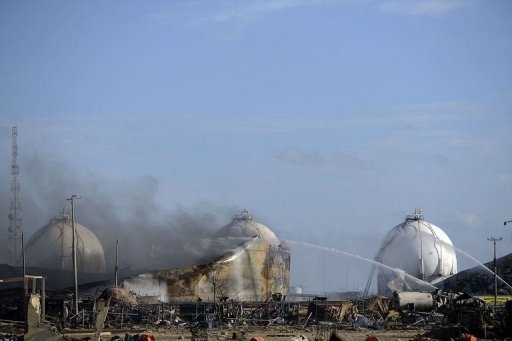Chavez eyes political fallout from deadly refinery fire

Oil Minister Rafael Ramirez said firefighters had finally put out the fire at the Amuay oil refinery, the country's largest, which spread to three storage tanks before being brought under control on Tuesday.
"With the expertise, skill and knowledge of our boys, we can finally tell the world that this is absolutely controlled. It was contained and now the fire has been extinguished," Ramirez told reporters at the refinery complex.
Earlier, sources at state-run Petroleos de Venezuela (PDVSA) had said the fire was put out in the last storage tank early Tuesday, only to have it flare up again in the morning as remnants of fuel inside burned off.
Ramirez, who is also president of PDVSA, said the site was in a "cooling" phase.
The blaze has been a major political embarrassment for Chavez, an anti-American firebrand who is in the midst of a campaign for re-election October 7 while recovering from a serious bout with cancer.
Angrily brushing aside accusations of declining maintenance and safety at the plant, Chavez ordered an investigation into the cause of the massive explosion that ripped through the refinery early Saturday.
Falcon Governor Stella Lugo said 48 people were killed in the conflagration, but Venezuelan attorney general Luis Ortega put the toll at 41 dead.
At least 20 members of a national guard unit assigned to protect the facility were killed, along with some members of their families.
The refinery is located in a residential and commercial complex where workers live with their relatives and poor families who settled in surrounding neighborhoods.
Lugo said said 520 houses near the refinery had been affected by the disaster, and residents could be seen Tuesday removing belongings with the held of national guard troops.
Chavez, 58, toured the scene dressed in mourner's black and hugged weeping family members.
In power since 1999, Chavez dismissed charges of neglect at the country's premier refinery and urged Venezuelans to "move on" after the tragedy.
Henrique Capriles, his presidential race rival, insisted the government needed to take responsibility.
"It seems irresponsible and insensitive to me, cold and bold, to say things must move forward. Well the country will move on, but there were people who lost their lives here," said Capriles.
"This is not a show or some soap opera. This is a serious situation that has stunned the nation."
"Accidents happen for a reason, and Venezuelans are awaiting a clear response and serious investigation ... to see what happened," said Capriles, 40.
Ramirez said Monday that the fire would not affect oil derivative exports or domestic supplies in Venezuela, an OPEC member and Latin America's biggest petroleum producer.
He said the country's other five domestic refineries could produce 735,000 barrels of fuel per day to take up some of the slack, while insisting that "all our export capabilities are intact."
Ramirez has also said the Paraguana facility -- which includes the Amuay and Cardon refineries -- will be able to operate at full capacity within two days after the fire is extinguished.
But Jose Bodas, general secretary of the United Federation of Oil Industry Workers, questioned that assessment on Monday.
"It appears to us that it is too early to talk about resuming production without knowing the exact cause of the explosion," Bodas told AFP.
The Amuay refinery was capable of producing 645,000 barrels per day before the incident, while the Cardon put out 310,000 bpd, according to official figures. The two facilities account for 66 percent of local demand.
Venezuela's heavily-subsidized gasoline is among the cheapest in the world.
The Latin American nation produces about three million barrels of oil per day, according to state figures, while the Organization of the Petroleum Exporting Countries (OPEC) puts the number at 2.3 million barrels per day.
What the stars mean:
★ Poor ★ ★ Promising ★★★ Good ★★★★ Very good ★★★★★ Exceptional
 Tag:
Tag:
Related Contents
Latest News
More News
- Russian President congratulates Vietnamese Party leader during phone talks (January 25, 2026 | 09:58)
- Worldwide congratulations underscore confidence in Vietnam’s 14th Party Congress (January 23, 2026 | 09:02)
- Political parties, organisations, int’l friends send congratulations to 14th National Party Congress (January 22, 2026 | 09:33)
- 14th National Party Congress: Japanese media highlight Vietnam’s growth targets (January 21, 2026 | 09:46)
- 14th National Party Congress: Driving force for Vietnam to continue renewal, innovation, breakthroughs (January 21, 2026 | 09:42)
- Vietnam remains spiritual support for progressive forces: Colombian party leader (January 21, 2026 | 08:00)
- Int'l media provides large coverage of 14th National Party Congress's first working day (January 20, 2026 | 09:09)
- Vietnamese firms win top honours at ASEAN Digital Awards (January 16, 2026 | 16:45)
- ASEAN Digital Ministers' Meeting opens in Hanoi (January 15, 2026 | 15:33)
- ASEAN economies move up the global chip value chain (December 09, 2025 | 13:32)






















 Mobile Version
Mobile Version